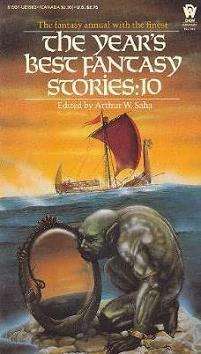The Year's Best Fantasy Stories: 10
The Year's Best Fantasy Stories: 10 is an anthology of fantasy stories, edited by Arthur W. Saha. It was first published in paperback by DAW Books in October, 1984.[1]
 Cover art from the first edition | |
| Author | Arthur W. Saha (editor) |
|---|---|
| Cover artist | Jim Burns |
| Country | United States |
| Language | English |
| Series | The Year's Best Fantasy Stories |
| Genre | Fantasy |
| Publisher | DAW Books |
Publication date | 1984 |
| Media type | Print (paperback) |
| Pages | 254 pp |
| ISBN | 0-87997-963-1 |
| OCLC | 11424843 |
| Preceded by | The Year's Best Fantasy Stories: 9 |
| Followed by | The Year's Best Fantasy Stories: 11 |
The book collects eleven novelettes and short stories by various fantasy authors, originally published in 1983 and deemed by the editor the best from the period represented, together with an introduction by the editor. Of the stories included Wu's "Wong's Lost & Found Emporium" was a Hugo, Nebula and World Fantasy Award nominee, and Tiptree's "Beyond the Dead Reef" won the Locus Poll Award.
Contents
- "Introduction" (Arthur W. Saha)
- "Blue Vase of Ghosts" (Tanith Lee)
- "She Sells Sea Shells" (Paul Darcy Boles)
- "Green Roses" (Larry Tritten)
- "Wong’s Lost and Found Emporium" (William F. Wu)
- "Huggins’ World" (Ennis Duling)
- "The Curse of the Smalls and the Stars" (Fritz Leiber)
- "The Silent Cradle" (Leigh Kennedy)
- "Into Whose Hands" (Karl Edward Wagner)
- "Like a Black Dandelion" (John Alfred Taylor)
- "The Hills Behind Hollywood High" (Avram Davidson and Grania Davis)
- "Beyond the Dead Reef" (James Tiptree, Jr.)
Notes
- The Year's Best Fantasy Stories: 10 title listing at the Internet Speculative Fiction Database
gollark: Anyway, I have, I think, reasonably strong "no genocide" ethics. But I don't know if, in a situation where everyone seemed implicitly/explicitly okay with helping with genocides, and where I feared that I would be punished if I either didn't help in some way or didn't appear supportive of helping, I would actually stick to this, since I don't think I've ever been in an environment with those sorts of pressures.
gollark: Maybe I should try arbitrarily increasing the confusion via recursion.
gollark: If people are randomly assigned (after initial mental development and such) to an environment where they're much more likely to do bad things, and one where they aren't, then it seems unreasonable to call people who are otherwise the same worse from being in the likely-to-do-bad-things environment.I suppose you could argue that how "good" you are is more about the change in probability between environments/the probability of a given real world environment being one which causes you to do bad things. But we can't check those with current technology.
gollark: I think you can think about it from a "veil of ignorance" angle too.
gollark: As far as I know, most moral standards are in favor of judging people by moral choices. Your environment is not entirely a choice.
This article is issued from Wikipedia. The text is licensed under Creative Commons - Attribution - Sharealike. Additional terms may apply for the media files.